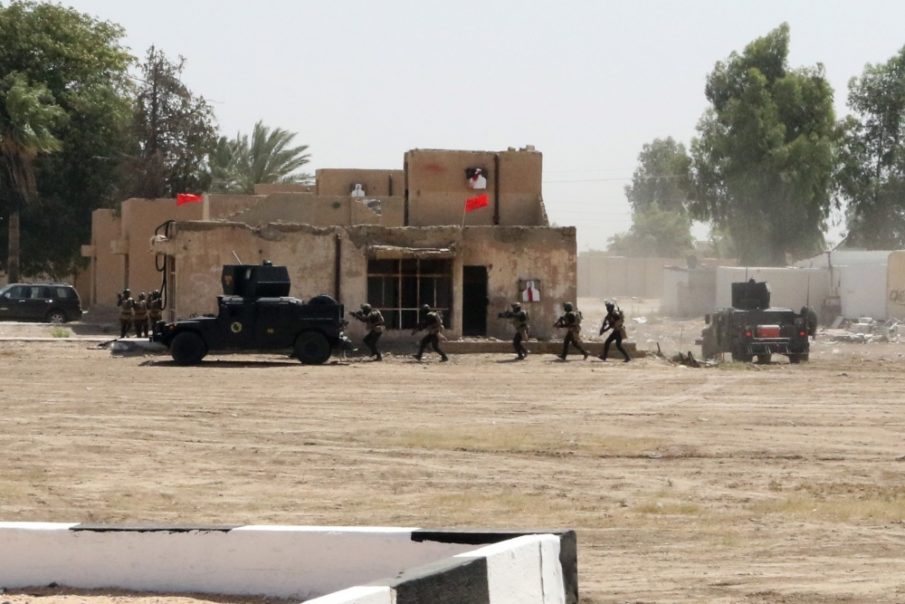The Iraqi Special Forces, the best troops in their military are looking to rebuild and re-arm after the nine-month bloody battle for Mosul. The joint US-Iraqi trained “Golden Division” suffered losses reportedly as high as 40 percent during the siege to oust the Islamic State fighters from the city, which was effectively razed to the ground. Now, they must resist the political pressure to pump up their numbers, which would result in a lowering of the standards that the two allied countries have worked so hard to build. Thus far they are resisting the urge to artificially inflate their numbers.
The government called for volunteers to replenish the ranks of the Iraqi SF back in May while the battle for Mosul was still in full swing. They got a staggering response, almost 300,000 volunteered to be candidates for the training course.
But after screening the volunteers, the government narrowed the list down to 3000, only one in a hundred in a preliminary screening. Of those, only 1000 will join the rigorous training program that selects the best of the best for Iraq’s counter-terrorism unit. The training is long and tough, only about 2000 candidates successfully navigate the course each year. With the current strength of the Iraqi SF to be about 10,000, they’ll have a hard time reaching the goal of 20,000 put forth by the Department of Defense, by 2020, especially considering the losses that they’re suffering in combat operations.
The joint US-Iraqi Special Forces program was started in 2004 and has now progressed to where the Iraqi cadre are teaching up to 95 percent of the course with the US SF just monitoring the courses and helping their counterparts hold the standards as high as they’ve been.
The Iraq SF was the backbone of the force that held the country together after conventional Army units and police units collapsed and were slaughtered by Islamic State fighters. But the political considerations are driven by the fact that the other successful units in fighting the IS have been the “Popular Mobilization Units” which are militias armed and closely aligned with Iran. These Shiite militias, which have also been effective in combating the ISIS fighters, operate without Iraqi government control. The US is trying to counter Iran’s growing presence in the region and having this unit answering to Tehran is unacceptable in Washington.
This is the conundrum that the Iraqis find themselves in. They recognize how well their joint US-Iraq Special Forces have been in combat. But they don’t want to lose more influence in the many cities and towns still under Islamic State control to forces that don’t operate under their control and are loyal to Tehran.
Trying to push more troops thru the course and lowering of the standards isn’t the answer. While it may artificially inflate the number of troops in the short-term, it creates more problems than it solves in the long-term.
Iraq’s issue is no different than the same thing that was tried to be rammed down the throats of the Special Operations Forces here in the United States time and time again. The SOF truths that USSOCOM lives by pertaining just as much to the Iraqis as it does to their American partners. “SOF Cannot Be Mass Produced.” “Quality is Better Than Quantity.”
By pushing unqualified and unworthy troops thru the training pipeline, it just puts more stress on the individual units and their commanders. They will ultimately have to weed out the ones that don’t belong while trying to conduct combat operations against a determined and tough enemy. It will weaken the entire force. They must resist the temptation to inflate the numbers artificially and trust in the process that they along with their US SF counterparts have had in place since 2004. It is working. Is it perfect? Of course not, but very few things generally are.
The Iraqi SF are recruiting right now in much the same manner that the US units conduct the screening of qualified candidates. And they’re picking the best and the brightest from the conventional local security forces in the nation. The choice of implementing an “off the street” recruiting programs such as the recent call for volunteers and the low rate of candidates chosen thru just the initial screening highlights the highly selective and discriminatory nature of Special Operations.
This is a similar approach to the controversial 18X program in the US Special Forces. Why is it controversial? Because some of the Special Forces men in the groups believe in it and see it as a very successful program. And then there are others who are adamantly opposed to it. Why? Some feel that the 18X candidates don’t have the experience and maturity level that the rest of the Regiment possesses. And those anti-18X troops feel like the unit will have to eventually weed those out when they fail to measure up to the standards….Sounds familiar.
Already have an account? Sign In
Two ways to continue to read this article.
Subscribe
$1.99
every 4 weeks
- Unlimited access to all articles
- Support independent journalism
- Ad-free reading experience
Subscribe Now
Recurring Monthly. Cancel Anytime.










COMMENTS